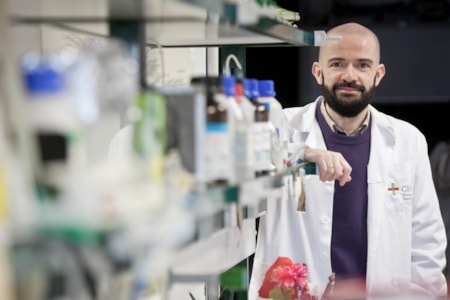
Researchers from NEUROFAN, a pharmacology group specialising in addictions and degenerative disorders, led by professor Gonzalo Herradón, and PROLIGAR and GESTOBES from the School of Pharmacy, have successfully identified a new molecular mechanism which causes alcohol to seriously damage adolescent brains. The researchers disclose: “We have identified an enzyme which is involved in the destruction of neural progenitors in the adolescent brain when exposed to alcoholic substances.” “We have proven that pharmacological inhibition of this enzyme is able to completely prevent damage produced by alcohol to the neural progenitors of the hippocampus, a part of the brain essential for memory and learning” states the professor Gonzalo Herradón.
The investigation has been published in Neurotoxicology magazine and has gathered the evidence that led researchers to identify the PTRZ enzyme as a protein which causes the death of neural progenitors when an excessive amount of alcohol is consumed. The ability of this protein to regulate neuroinflammation induced by alcohol seems to be a crucial factor in its role in the toxic effects of alcohol on the adolescent brain.
The NEUROFAN group is part of the Red de Investigación en Atención Primaria de Adicciones (RIAPAd) and this finding is the result of a research project by the National Drugs Plan. This project focused on new strategies to mitigate brain damage produced by alcohol intake during adolescence, especially when abusing alcohol consumption in a short period of time, also known as binge drinking. “Our research on animals modelling the alcohol intoxication observed in some adolescents who binge drink, has shown the loss of neural progenitors in parts of the brain such as the hippocampus. These neural progenitors are necessary later on in life so they can grow into mature neurons and palliate the effects of ageing in the brain, or to mitigate other types of brain damage which can occur during life”, says the professor Gonzalo Herradón.
NEUROFAN researchers, who are also part of the Instituto CEU de Estudios de las Adicciones, have spent years studying how the PTPRZ enzyme functions in the brain. During the last few years, the development of new compounds which regulate PTPRZ activity has been a significant milestone thanks to collaboration with the university’s PROLIGAR and GESTOBES research groups. The lead compound, MY10, has shown its efficiency in blocking the neurotoxic effects of alcohol on neural progenitors in the adolescent progenitors. “These results mark the origin of the discovery of new drugs used in the treatment of alcohol-related disorders and the prevention of brain damage caused by this substance. We know that an excess consumption of alcohol, especially seen in adolescents and young adults, is associated with an increased risk of developing premature dementia,” states the University professor.